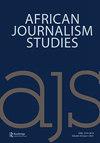Partisanship, News Use, and Political Attitudes in Ghana: An Application of the Communication Mediation Model
IF 1.8
3区 文学
Q3 COMMUNICATION
引用次数: 1
Abstract
ABSTRACT Past communication mediation studies have shown positive relationships between news uses and citizens’ political attitudes, but understanding the mechanisms underlying the relationship is limited because they often do not take into account the diverse affordances of the media uses and the environment it triggers effects. Using a national Afrobarometer survey (N = 2,400) in Ghana, the present study examined the relationship between news uses and a variety of citizens’ political attitudes and how such relationships are affected by partisanship. Based on a series of regression analysis, findings showed that online news uses consistently predicted all levels of citizens’ political attitudes while traditional news uses were only associated with citizens’ levels of presidential trust and confidence. When partisan differences were further examined, results showed that only online media uses by ruling party members exhibited direct effects on trust in president and democratic satisfaction. However, in all, traditional media news uses based on ruling party support and no party members exhibited indirect effects on political attitudes. Oppositional party members showed no effect.加纳的党派关系、新闻使用和政治态度:传播中介模型的应用
过去的传播中介研究表明,新闻使用与公民政治态度之间存在正相关关系,但对这种关系背后的机制的理解有限,因为这些研究往往没有考虑到媒体使用的多样性及其引发影响的环境。本研究利用加纳全国非洲晴雨表调查(N = 2400),考察了新闻使用与各种公民政治态度之间的关系,以及这种关系如何受到党派偏见的影响。基于一系列回归分析,研究结果表明,在线新闻的使用一致地预测了公民的所有政治态度,而传统新闻的使用仅与公民对总统的信任和信心水平有关。当进一步研究党派差异时,结果显示只有执政党成员使用网络媒体对总统信任和民主满意度有直接影响。然而,总体而言,传统媒体的新闻使用基于执政党的支持,没有政党成员对政治态度表现出间接影响。在野党议员没有表现出任何效果。
本文章由计算机程序翻译,如有差异,请以英文原文为准。
求助全文
约1分钟内获得全文
求助全文
来源期刊

African Journalism Studies
COMMUNICATION-
CiteScore
1.90
自引率
10.00%
发文量
18
期刊介绍:
Accredited by the South African Department of Higher Education and Training for university research purposes African Journalism Studies subscribes to the Code of Best Practice for Peer Reviewed Scholarly Journals of the Academy of Science of South Africa. African Journalism Studies ( AJS) aims to contribute to the ongoing extension of the theories, methodologies and empirical data to under-researched areas of knowledge production, through its emphasis on African journalism studies within a broader, comparative perspective of the Global South. AJS strives for theoretical diversity and methodological inclusivity, by developing theoretical approaches and making critical interventions in global scholarly debates. The journal''s comparative and interdisciplinary approach is informed by the related fields of cultural and media studies, communication studies, African studies, politics, and sociology. The field of journalism studies is understood broadly, as including the practices, norms, value systems, frameworks of representation, audiences, platforms, industries, theories and power relations that relate to the production, consumption and study of journalism. A wide definition of journalism is used, which extends beyond news and current affairs to include digital and social media, documentary film and narrative non-fiction.
 求助内容:
求助内容: 应助结果提醒方式:
应助结果提醒方式:


